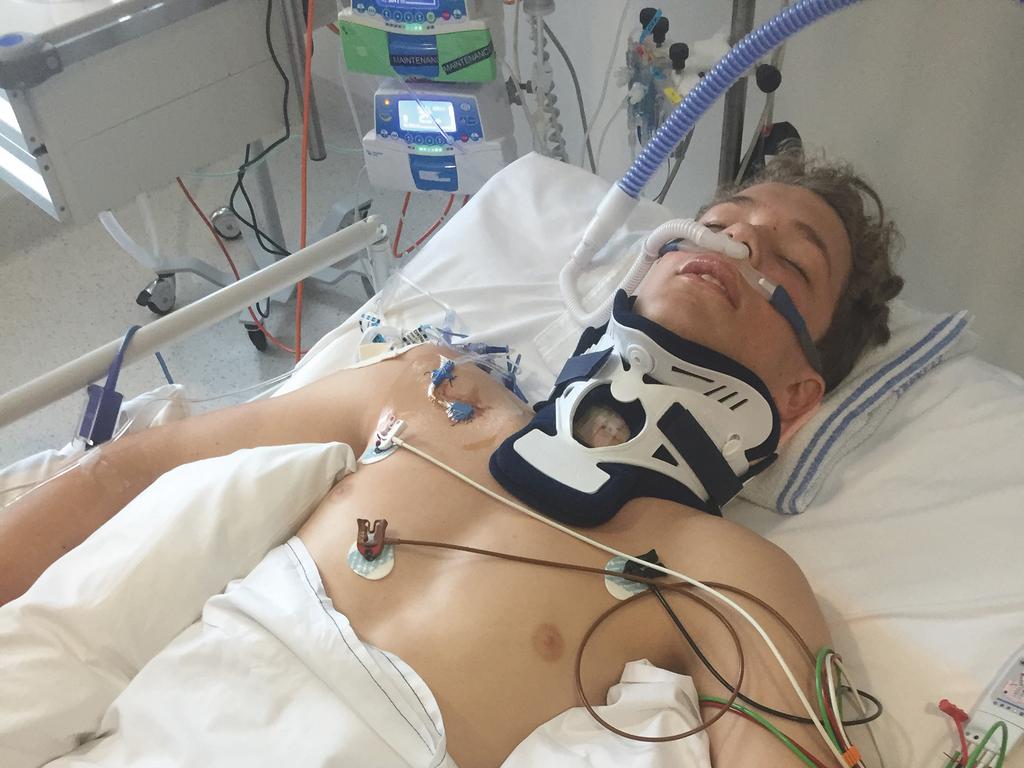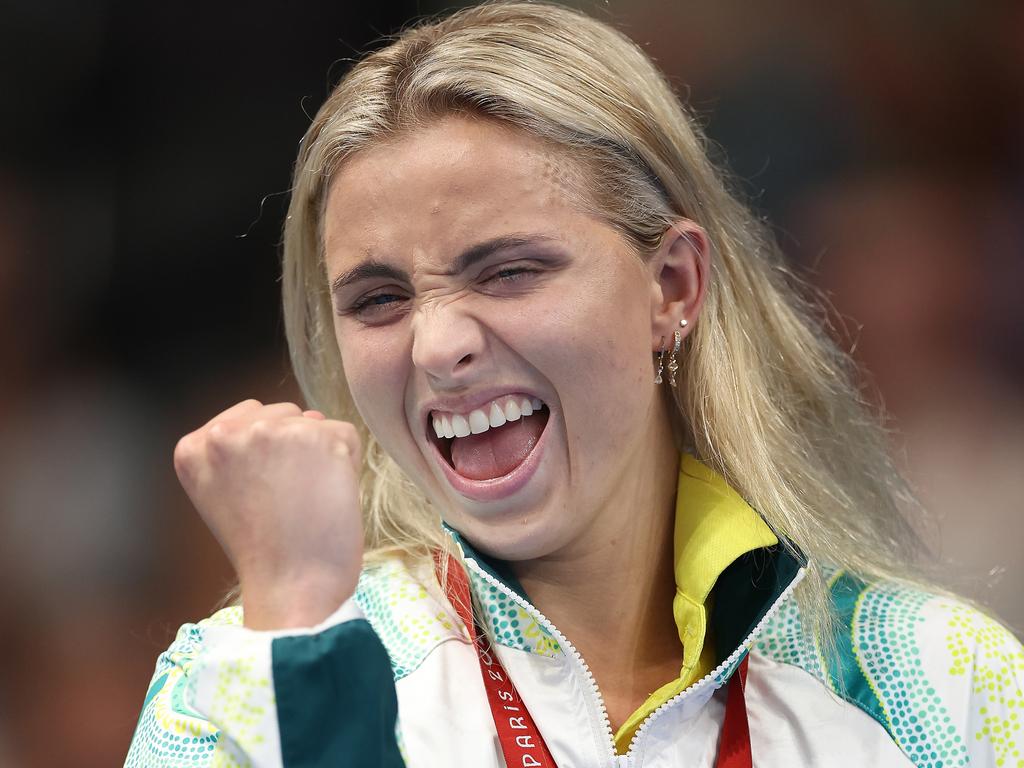Alexa Leary: The nightmare inside a Paralympics fairytale
It’s one hour after Alexa Leary’s victory at the Paris Paralympics. We’re having a beer with her old man, Russ, at the pub across the road. Come on, mate. Tell us the whole story. ‘Standing here right now,’ he says, ‘I’d go over to the pool and hand the medal back.’ Brace yourselves.
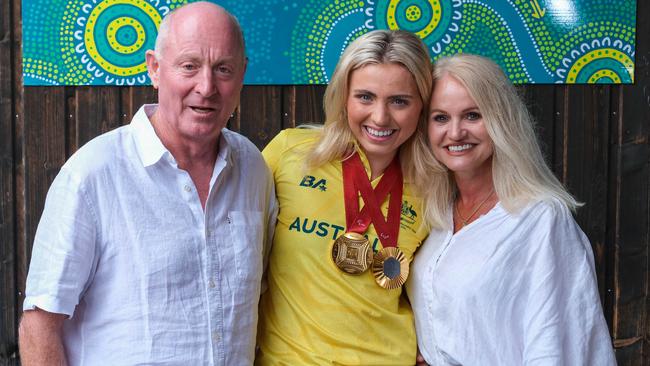
You can now listen to The Australian's articles. Give us your feedback.
It’s one hour after Alexa Leary’s victory at the Paris Paralympics. We’re having a beer with her old man, Russ, at the pub across the road. Come on, mate. Tell us the whole story.
“Nightmare,” he says. “Three years of pain. A night like this is bloody great but if you want me to be completely honest, if you want the truth, nightmare is the word I keep thinking of. It’s been a rollercoaster, a journey, an ordeal, a challenge, a nightmare inside the fairytale. Even a-year-and-a-half ago, Lex was still uncontrollable from the brain damage. Nobody knows what really goes on.”
He says: “Fairytale? I get it. Part of me also thinks, give me a break. There were times in the early days when Lex needed so much specialised care that we thought we should put her in a home.
“Standing here right now, if we could do a swap and you could make Lex’s brain all right again – I’d go over to the pool and hand the medal back.”
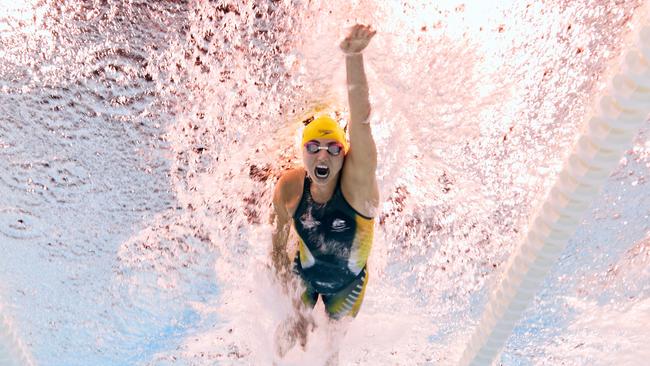
Leary’s gold medal-winning, happy-go-lucky, laugh-a-minute, dancing-to-Kylie-Minogue-in-the-most-joyful-podium-appearance-in-history performances in Paris have indeed been soul-stirring, Hollywood-worthy triumphs. And yet real issues shouldn’t be masked. Deeply harrowing private challenges are ongoing. The narrative centres on the catastrophic bike accident, followed by the brain injury, followed by 111 days in hospital, followed by the brave recovery, followed by Paralympic glory. Hooray. But I want Russ to pause at the brain injury. There’s gotta be a whole lot of stuff going behind the scenes.
Over our first beer at Corcoran’s, Russ says: “When you get told your daughter is never going to walk or talk again, you think, ‘What the f..k? Her life is basically over.’ You go crazy. You’d do anything to change it for her. You want to swap with her. I wanted to be in the coma if it meant she didn’t have to be. I’d take the brain damage. In the early days, she was so angry. I thought she was going to hit me. The first thing we had to do was work out how not to trigger her. She gets frustrated and swears and you have to calm her down. From day one, I would have done and given anything for her to be all right. I still would.”
If you’ve seen TV coverage of Lex’s triumphs this year, you know Russ could cry for Australia. He’s a big-hearted, kind-spirited, generous, green-and-yellow-wig-wearing, life-of-the-party sort of soul. Tucked into a corner of the watering hole nearest La Defense Arena, though, his brow furrows and he says: “This is good to talk about. People need to know.”
It’s been reported Russ was the first to see Lex slumped on the road in a crippled mess after her high-speed cycling accident on the Sunshine Coast in 2021.
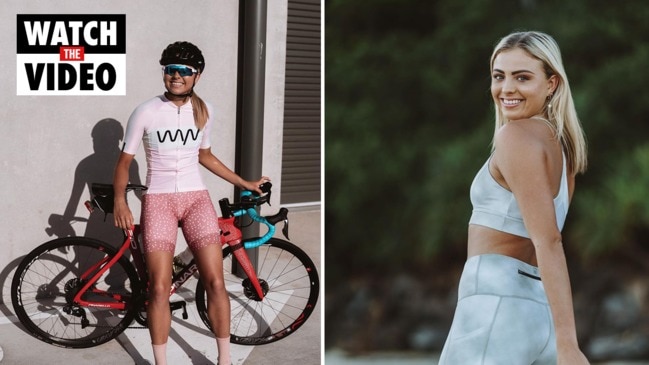
“Not true,” he says. “There was a bunch of probably 20 people riding with Lex in an elite group. I was riding a long way behind. The first guy by her side just happened to be a doctor. He positioned her in the right way until we had help, and that saved her life. We were at the bottom of a hill. Another rider was a local who knew there was no phone range. He was at the top of the hill and called the ambulance straight away. It could have taken us forever. That saved her life. The ambulance driver was a bike rider and knew exactly where she was. He got to us in about five minutes flat, and that saved her life.
“Three times on the road, she should have died. Then we got to the Sunshine Coast hospital and we were told, ‘It’s all over. She’s not going to make it. Even if she gets to Brisbane, you’ve got a vegetable on your hands. I was like, bugger. Not a good start to a Saturday. I was going for a beer and a bet.”

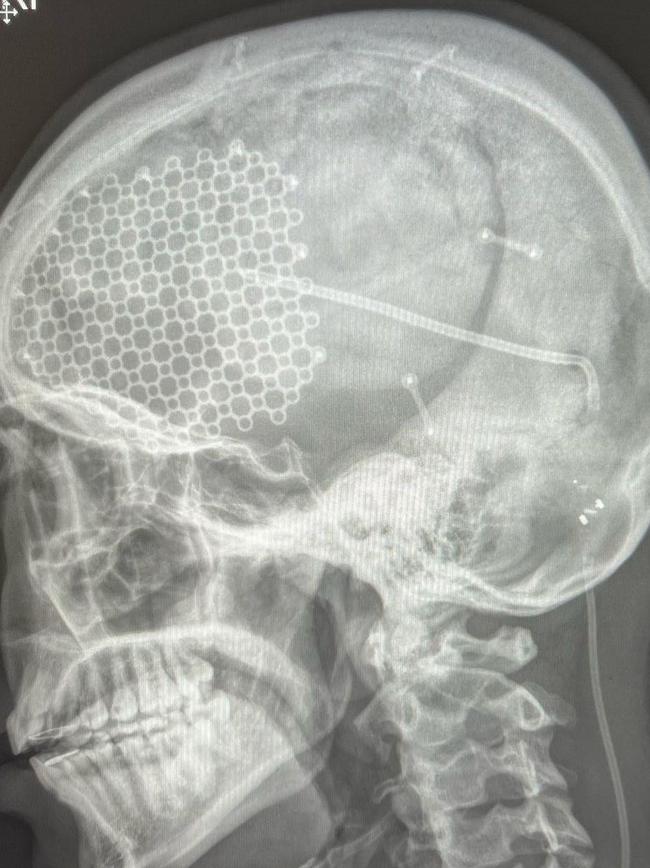
What did you see on the road? He gives a thousand-yard stare and says, “I’ll tell you what it was like when I rode up to her. For starters, I didn’t know who it was because I was too far away. Then as I rode closer, it was like – I had this feeling of somehow riding into a dark cloud. ‘Please tell me that isn’t my daughter. Please.’ I broke down. Completely. It was like everything was in slow motion. It was like the worst movie scene you could imagine. I saw her there, my daughter, blood everywhere, crumpled up so badly I could barely recognise her. I felt sick, I was in shock, I’m sorry but I cannot even describe it properly. My daughter. A guy put me in his car and drove me home because I was such a f..ing mess.”
Over our second beer at Corcoran’s, Russ considers the eight times in Lex’s 111-day hospital stay that doctors said she might be gone in a sec.
“Eight bloody times,” he repeats. “The first time, they wanted to take her skull off. They rang us and said, ‘Righto, you’d better get here now. If you don’t sign off on this, she’ll die.’ I was like, ‘Just take the f..ing thing off!’ She had a blood clot in her neck that was going to take her. They gave her thinners, but the thinners stuffed up her brain. That was going to take her.


We had to take the risk with the blood clot. She got viruses and infections and fevers. When they had to take her breathing tube out, they said, ‘She might not be able to breathe properly on her own. This could be the end.’”
Lex and another patient were in the same room.
“How crazy is this,” Russ says. “The guy in the bed next to her, they had to take his tube out, too. We were in the hallway and we could hear all the death rattles. We go back in, fearing the worst, and Lex is still alive. The poor bloke next to her has died. The doctor said, ‘I honestly thought your daughter would have been the one we lost.’ Those things happened all the way through. Like I say, a nightmare and a rollercoaster. I don’t think I’ve ever heard a story like it. The surreal thing is that it’s my daughter we’re talking about.”
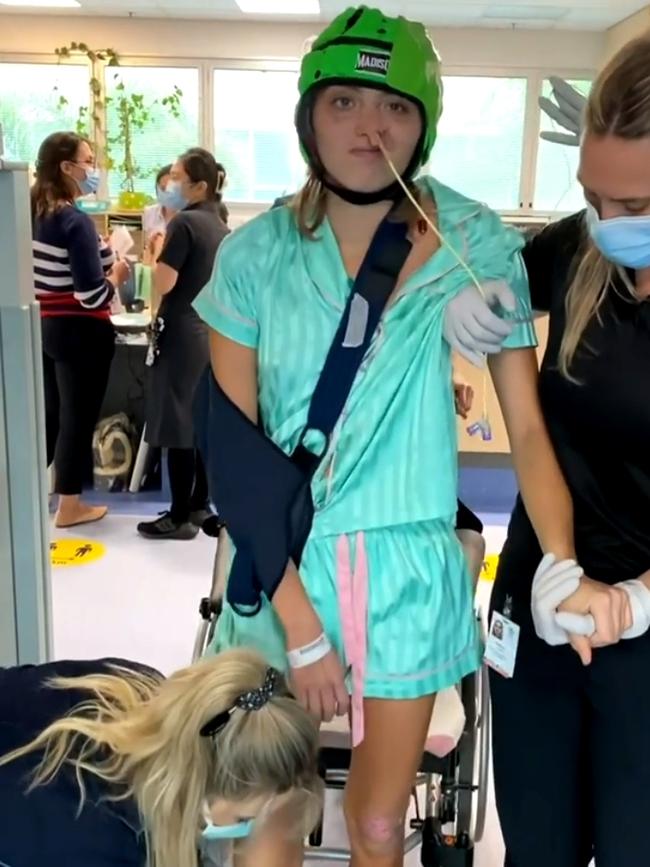
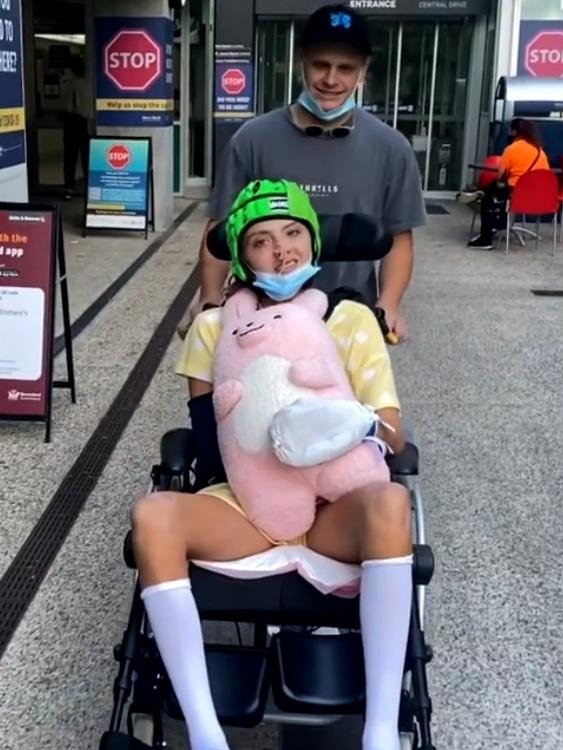
Another misconception is that Russ sought the input of a fortune teller. “It wasn’t a fortune teller. We employed a quantum healer at one stage,” he says. “People think it was a fortune teller but the healer – it’s someone who believes your thoughts and your attitude can help you pull though in situations like this. We hired this lady who told me the universe would work on Lex. I said, ‘Yep, great. Whatever. Let’s give the universe a go.’ ”
In the first week of quantum healing, “the lady looked at me and said, ‘Alexa wants you to rub Voltaren on her neck.’ I nearly fell over. Lex always liked that. She loved Voltaren on her neck. The lady couldn’t have known that. And then, I wasn’t looking at Lex’s face a lot. I used to rub her feet. The lady said to me, ‘Alexa wants you, Dad, to start holding her hand.’ We ended up believing this was helping, rightly or wrongly. Lex was still in a terrible way when the lady told me, ‘She’ll win a gold medal at the Paralympic Games.’ That same lady texted me today and said ‘It happened!’ ”
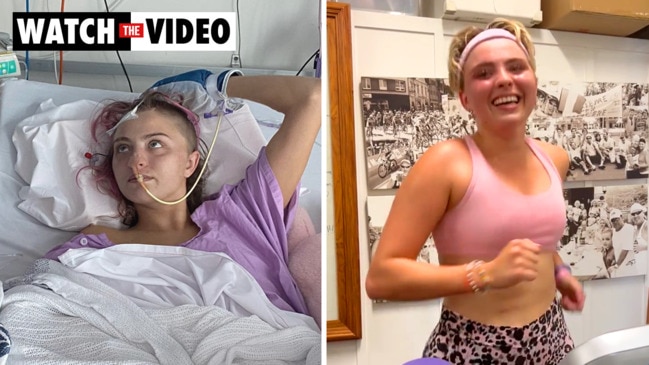
Lex says: “I’ve just come so far in life. Like, being told three years ago I wouldn’t live, but I am. Once again I proved the world wrong. I’m walking and I’m talking when we were told I would never. The fact that I am swimming so very well and at the Paralympics – I’m just like, well done, Lex! You have honestly come so very far.”
Accident. Brain injury. One-hundred-and-eleven days in hospital. Brave recovery. A whole lot of stuff behind the scenes. Paralympic glory. Hooray. In a way. What’s Lex’s life actually like?
“She’s got to have a carer,” Russ says. “The raw truth is that’s tough for her. She needs a behavioural coach. She needs OTs (occupational therapists). She goes back to (Australian neurosurgeon) Charlie Teo after this to get her brain zapped again. He’s really helped with the stimulation of the brain, putting magnetic forces into the pathways where the brain damage is. Like, she used to have no short-term memory. She’d put her phone right next to her then say, ‘Where’s my phone? Where’s my phone? Why can’t I find my phone?’ She’d get frustrated. Angry. Then when we took her to Charlie Teo for the zapping, and her short-term memory came back. Straight away. That was incredible.”
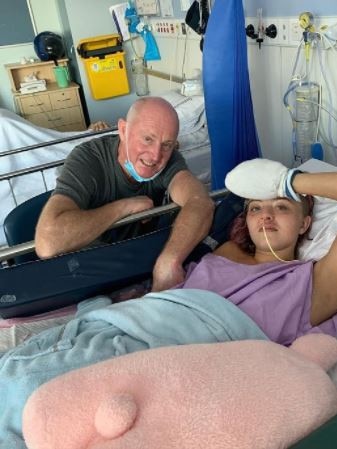

Over our third beer at Corcoran’s, Russ takes off his green-and-yellow wig. “There’s been a lot of pain, you know,” he says. “It’s not just what Lex is going through. It puts pressure on your marriage, but we’ve survived. Your other kids’ lives are turned upside down because you’re giving so much time to one daughter. They have been unbelievable. I think if we did one thing right, we never gave up.”
Russ adds: “I’m very conscious of the fact that other families are dealing with brain injuries. It’s not just us. I don’t want them to think we’ve breezed through. I want people to know how difficult it is for any family in this situation. It puts pressure on your marriage. Your other kids’ lives are turned upside down. It tests you financially, emotionally, physically. We had 18 months of, ‘What are we going to do with this girl? How do we fix this?’ None of it is easy.
“A place like a neuro ward is so sad. Brain-damaged people. It’s sad for them because it’s not their fault. They’re belting walls, they’re angry. We sat there 24/7 to protect Lex. She was aggressive, too, but it’s not her fault. You have to understand the truth of it all. We had a horror show on our hands.”
Lex says: “Dad was constantly on his knees, every single day in that hospital, next to my bed.”
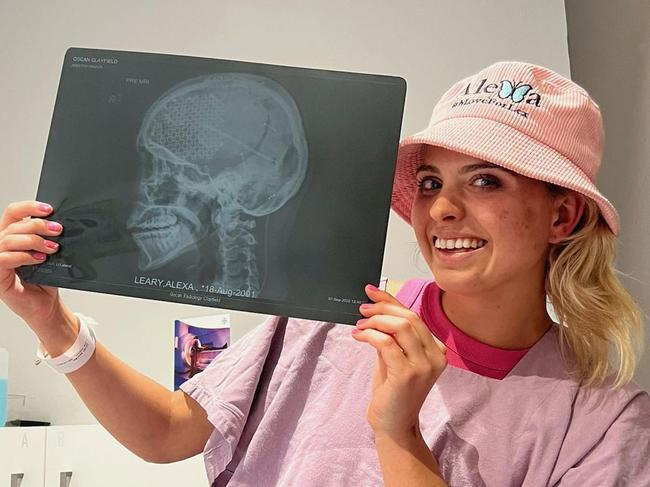
Dad says: “There was definitely a stage when we thought she was losing the fight herself. All she wanted was for everything to be black in her hospital room. Curtains closed. She just lay there. She couldn’t talk. Couldn’t walk. Her left arm worked and she used it to pull the tube out of her head. We thought, ‘She’s giving up. We’re losing her.’ She got her spirit back. I think her own toughness was part of it. It didn’t guarantee anything but there’s always been a lot of internal spirit in that kid. She’s strong. She’s gutsy. She won’t get beaten.”
Russ has seen two Lexs. This one has Attention Deficit Hyperactivity Disorder and Obsessive Compulsive Disorder. She’s tried brushing her hair with a toothbrush. A gallant if disoriented effort. She needs alarms on her phone to remind her where to go and what to do. Her beautiful loveheart tattoo matches a friend’s – but it but she can’t remember who the friend is. “Old Alexa used to be so functional,” she says. “Now I can’t remember anything. When people find out they act like it’s nothing. They’ll say, ‘Oh, okay’, but for me, this is for life. It’s big for me. People aren’t aware of it.”
Russ says: “Her behaviour now is nothing like it was before the accident. The girl we had before, we did actually lose her. We got a new girl instead. It’s like getting two kids out of one. I love them both, the old Lex and the new Lex. They’re completely different. Before the accident, she was just a really dedicated triathlete. She’d eat really well. She wasn’t especially outgoing, much quieter than this. Now we’ve got the life of the party. The new Lex is nothing if not a character, and you don’t get many champion athletes who are characters.”
Everything from the fourth beer onwards at Corcoran’s can stay off the record. Russ puts his wig back on and throws himself into the revelry alongside a mass of family and friends from Australia. From those teary-eyed TV interviews, we’ve seen how much Russ loves his daughter. I can see now why Lex loves her Dad. She’s got a good one. A passionate one. A lively one. You have honestly come so very far. Come on, mate. What’s the moral to the story?
“You have to believe in miracles,” he says. “I could talk about this all day and night but I think that’s what it boils down to. You just have to believe in miracles and on a night like this, I do.”


